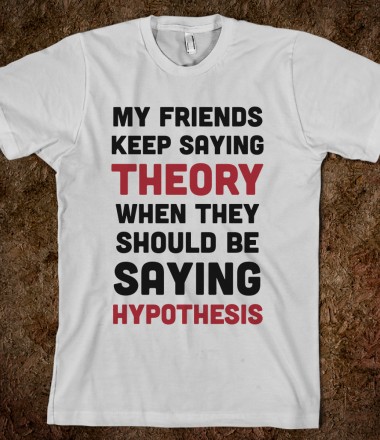It’s not often that we get into science when we start talking about writing. So, this week, we’ll delve into a little geek-speak and look at the differences between hypothetical things and theoretical things.
Hypothetical refers to things that are “assumed by hypothesis; of, pertaining to, or characterized by hypothesis; given to making hypotheses.” The fourth definition involves the principles of logic of either a highly conjectural/not well supported by available evidence proposition or a conditional proposition.
Theoretical refers to something that is “of, or pertaining to, or consisting in theory.” Theories are a coherent group of tested general propositions, commonly regarded as correct.
Here’s the kicker – theory/hypothesis; hypothetical/theoretical – the dictionary lists them as SYNONYMS.
Sigh, ok, so what’s a well-meaning word nerd to do? Common usage has these two words being fairly interchangeable when considering something “speculative.”
“Hypothetically, if I run 10 miles a day, I’ll lose weight.”
“Theoretically, if I run 10 miles a day, I’ll lose weight.”
If I run 10 miles a day, I’ll lose weight – is that a theory (tested general proposition, commonly regarded as correct) or a hypothesis (a proposition set forth as an explanation for the occurrence of some specified group of phenomena)?
Remember that a theory started out as a hypothesis, and through proven experiments, became a fully-tested theory.
A hypothesis starts out as an educated guess on what we think will happen. Proving ourselves right or wrong will take that hypothesis to a theory.
“Hypothetically Speaking” vs “Theoretically Speaking” Compared
The phrases “hypothetically speaking” and “theoretically speaking” are often used interchangeably, but they have subtle differences in meaning and context.
- Hypothetically Speaking: This phrase is used when discussing a situation or a condition that is imagined for the sake of argument. When someone says “hypothetically speaking,” they are typically exploring a scenario that may not be real or has not occurred, but is possible or conceivable. For example, “Hypothetically speaking, if I won the lottery, I would travel the world.” Here, the speaker is imagining a situation that hasn’t happened but could happen.
- Theoretically Speaking: This phrase is often used when discussing something based on theory, principles, or in a more abstract, academic context. When someone says “theoretically speaking,” they refer to what should happen according to a particular theory or under certain assumed conditions. For instance, “Theoretically speaking, a perfect market would lead to efficient allocation of resources.” This implies that, according to economic theory, certain outcomes are expected under the concept of a perfect market.
In summary, “hypothetically speaking” is generally used to explore imagined, possible scenarios, often in a more practical or real-world context, while “theoretically speaking” is used to discuss what is expected or predicted according to a specific theory or in a more abstract sense.
Real-Life Examples of Hypothetical and Theoretical
Here are examples to illustrate the difference between “hypothetical” and “theoretical”:
Hypothetical Examples
- Hypothetical Situation in Everyday Life: Imagine your friend asks, “Hypothetically, if you found a wallet full of cash on the street, what would you do?” This question invites you to imagine a specific situation that hasn’t occurred but is possible.
- Hypothetical Scenario in Business: A business meeting might include a discussion like, “Hypothetically speaking, if our main competitor were to lower their prices drastically, how would we respond?” This prompts a discussion about a potential, yet not actual, business situation.
- Hypothetical Case in Law: In a law school, a professor might ask, “Hypothetically, if someone was accused of a crime but the evidence was obtained illegally, what would be the legal implications?” This helps students think through a possible legal scenario.
Theoretical Examples
- Theoretical Concept in Science: A physics teacher might explain, “Theoretically, according to Einstein’s theory of relativity, time dilation occurs as an object approaches the speed of light.” This is discussing a concept based on scientific theory.
- Theoretical Model in Economics: An economist might say, “Theoretically, in a perfectly competitive market, no single buyer or seller has the market power to influence prices.” This refers to an economic theory under ideal conditions.
- Theoretical Approach in Philosophy: A philosophy lecture might include, “Theoretically speaking, utilitarianism posits that the most ethical choice is the one that will produce the greatest good for the greatest number.” This is an explanation based on theoretical principles of ethics.
In these examples, the hypothetical situations are about imagining specific scenarios that could occur, while the theoretical examples are about abstract principles or models that explain how things should work according to a certain theory.
My #1 Writing Tip is to Always Consider Your Audience
If I’m writing for a scientific journal, I’m going to make darn sure that I’ve got my hypotheses and theories in separate corners and dragging them out in appropriate context, lest I be raked over the coals by someone with multiple advanced degrees and published works on a particular theory.
In less formal writing, I don’t know that anyone else would really know the difference.
Quick Recap
- Educated guess? Hypothesis.
- Proven and generally accepted as true? Theory.
This topic came up as we were trying to troubleshoot a technical issue, so it is really interesting to look at this in that context. When asked if the fix we were trying to put in would work, should we have said, “Theoretically, yes.” or “Hypothetically, yes.”?
